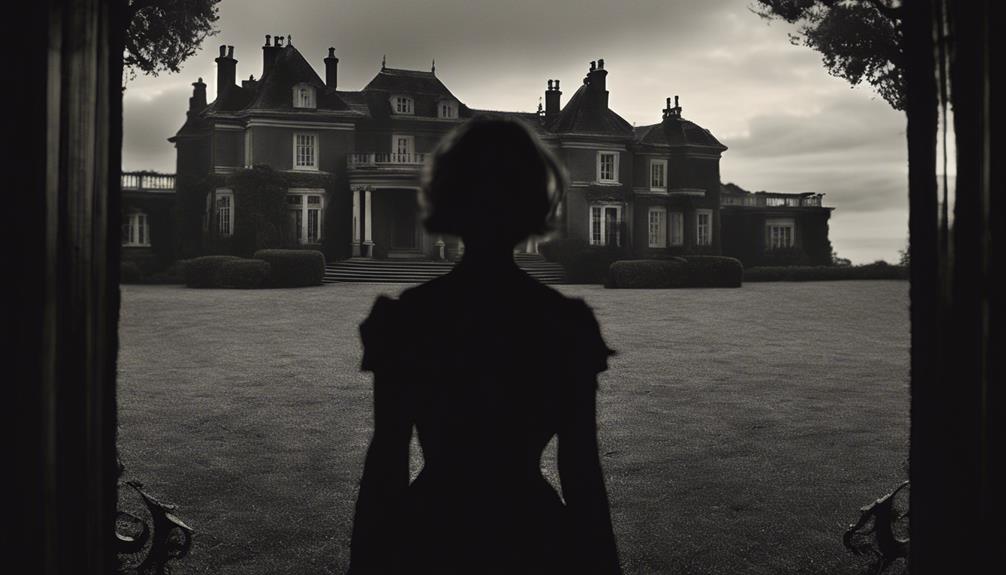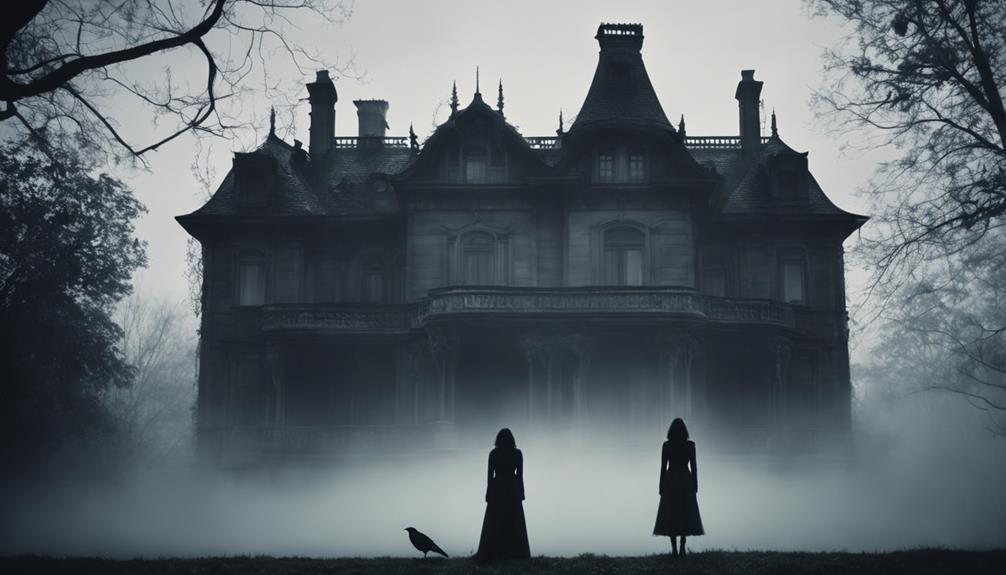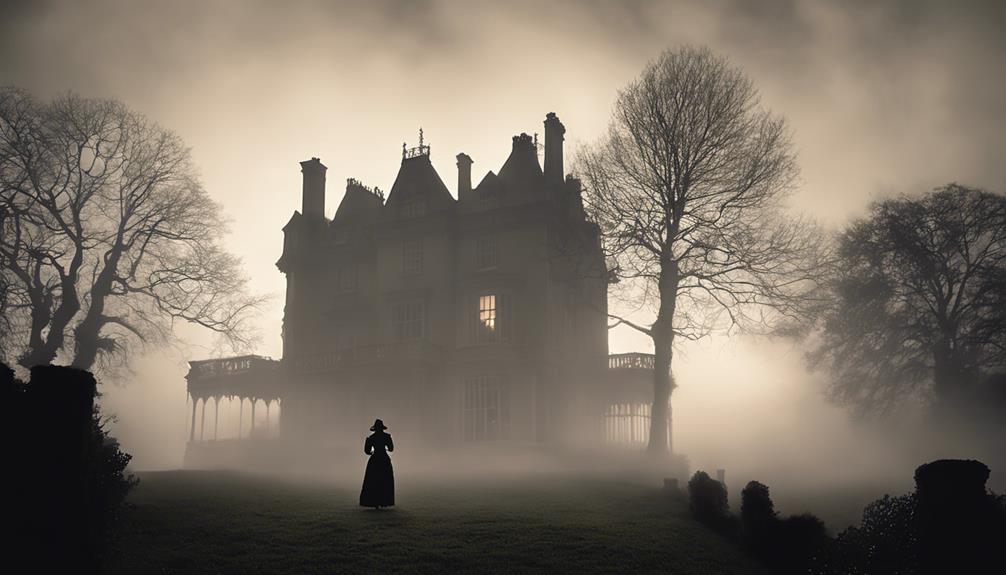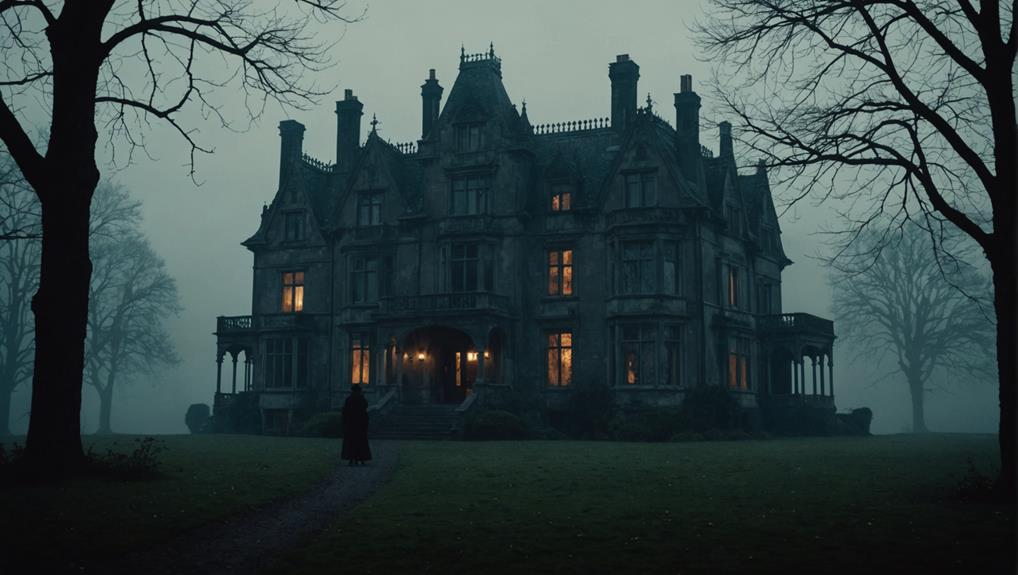Immerse yourself in the chilling tale of ''Rebecca'' by Daphne Du Maurier, where dark secrets shroud the grand estate of Manderley, haunted by the lingering presence of Maxim's first wife. Witness the unsettling legacy left behind by Rebecca and the intricate web of manipulation woven by the sinister Mrs. Danvers. Explore themes of jealousy, obsession, and power struggles amidst a backdrop of shifting gender roles and societal expectations. Uncover hidden depths, archetypal representations, and the lasting cultural impact of this Gothic mystery that continues to captivate audiences with its enigmatic allure.
Plot Summary
The plot of 'Rebecca' revolves around the mysterious death of Maxim de Winter's first wife, Rebecca, and the unsettling heritage she leaves behind. After the unnamed narrator marries Maxim, becoming the second Mrs. de Winter, she moves to Manderley, his grand estate.
There, she encounters Mrs. Danvers, the sinister housekeeper devoted to Rebecca's memory. As the new Mrs. de Winter explores Manderley, she uncovers secrets about Rebecca that shatter her perceptions of her husband and their marriage.
Throughout the story, annual events like the costume ball at Manderley serve as pivotal moments where the protagonist grapples with her insecurities and fears, all while feeling the looming presence of Rebecca.
Daphne du Maurier weaves a psychological melodrama that explores themes of truth and imagination, adding layers of complexity to the plot and character dynamics. As the narrative unfolds, the legacy of Rebecca haunts the characters, shaping their actions and relationships at Manderley.
Character Analysis
Examining the complex characters in 'Rebecca' exposes layers of intrigue and depth in their personalities and motivations. The unnamed narrator, also known as the second Mrs. de Winter, struggles with self-doubt and the shadow of Rebecca looming over her.
Maximilian de Winter appears brooding and secretive, haunted by his past with the enigmatic Rebecca. Mrs. Danvers, the sinister housekeeper of Manderley, manipulates and torments the second Mrs. de Winter, obsessively devoted to the memory of Rebecca.
Secondary characters like Beatrice and the Manderley staff add to the intricate dynamics within the story, influencing the unfolding drama and conflicts that shape the narrative. The interactions among these characters drive the plot forward, revealing dark secrets and hidden motivations that keep readers engaged and guessing throughout the Gothic mystery.
Themes Explored

You'll find 'Rebecca' to be a psychological exploration of characters, delving into their complexities and inner struggles.
The novel also challenges traditional gender roles, shedding light on power dynamics and societal expectations.
Through rich symbolism and narrative depth, Du Maurier weaves a compelling story that lingers in your mind long after you've finished reading.
Psychological Exploration of Characters
Delving into the psychological depths of characters in 'Rebecca' uncovers intricate themes of identity, insecurity, and the lingering echoes of the past. The Gothic atmosphere of the novel intertwines with the psychological exploration of characters, offering a profound understanding of their motivations and actions.
As you journey through the pages, you'll come across:
- The unnamed narrator's evolution from insecurity to self-discovery, shaping the narrative's emotional core.
- Mrs. Danvers' malevolent manipulation and unwavering devotion to Rebecca, adding layers of complexity to the character dynamics.
- Maxim de Winter's haunted past and intricate emotions, contributing to the psychological richness of the story.
- Themes of jealousy, obsession, and power struggles among women, intricately woven into the character interactions.
- The exploration of how the characters' insecurities and desires drive the narrative forward, creating a web of psychological depth that captivates readers till the very end.
Gender Roles in Society
In 'Rebecca,' the investigation of gender roles in society during the interwar period reveals a nuanced portrayal of women's challenges and evolving autonomy. Daphne du Maurier explores the tensions between societal expectations and women's autonomy, particularly within relationships and identity.
The novel highlights power dynamics and control, illustrating the difficulties women faced in balancing personal agency with conforming to traditional gender norms. Through the unnamed narrator's transformation from passivity to agency, Du Maurier mirrors the changing roles of women in society during the 1930s.
By challenging archetypal representations of female characters, the author offers a multifaceted examination of gender dynamics, showcasing the complexities and struggles women encountered in a society bound by rigid conventions.
'Rebecca' consequently serves as a poignant reflection of the challenges and evolution of gender roles during a time of societal upheaval and change.
Symbolism and Narrative Depth
Exploring the symbolism and narrative depth in 'Rebecca' adds layers of complexity and insight to the themes of power struggles, identity, and self-discovery within the novel.
Delving into the narrative depth of 'Rebecca' uncovers a tapestry of interconnected themes and emotions that resonate with readers.
The symbolism present in the novel, such as motifs of light and dark, dreams, and memories, serves as a lens through which the characters' inner struggles are magnified.
Manderley, the haunting setting of the story, symbolizes the lingering conflicts of the past, echoing through the present and shaping the characters' fates.
Love, jealousy, and obsession recur as motifs, weaving a web of intrigue and complexity within the narrative.
Through the interplay of symbolism and narrative depth, 'Rebecca' offers a profound exploration of human experiences and relationships that leave a lasting impact on those who immerse themselves in its pages.
Literary Influences
Literary inspirations for 'Rebecca' by Daphne du Maurier can be traced back to the classic novel 'Jane Eyre,' particularly in their shared themes of young heroines and enigmatic men. Both stories explore atmospheric and psychological depths, weaving intricate narratives around the dynamics between the female protagonist (Mrs de Winter in 'Rebecca,' Jane Eyre in 'Jane Eyre') and their brooding male counterparts (Maxim de Winter in 'Rebecca,' Mr. Rochester in 'Jane Eyre').
The imposing estates of Manderley and Thornfield Hall serve as pivotal backdrops, shrouded in mystery and Gothic allure.
Published amidst societal changes in 1938, 'Rebecca' reflects evolving gender norms and expectations, grappling with the tension between autonomy and societal pressures. These themes resonate with the archetypal representations of women, from the enigmatic Rebecca de Winter to the unnamed narrator's transformation from a traditional 'Angel in the House' to a character with agency and independence.
Through these influences, 'Rebecca' emerges as a timeless exploration of love, identity, and the complexities of human relationships.
Archetypal Representations

Rebecca de Winter and the unnamed narrator in 'Rebecca' embody contrasting archetypes, symbolizing hidden darkness and evolving independence, respectively.
Mrs. de Winter represents the archetype of the 'Mad Woman in the Attic,' reflecting mystery and concealed depths.
In contrast, the unnamed narrator progresses from the 'Angel in the House' archetype to a more assertive and independent character, showcasing personal growth and empowerment.
Du Maurier's portrayal of women in 'Rebecca' explores societal expectations and challenges faced by women during the interwar period.
Through the examination of archetypal representations, the novel gains depth and complexity, enriching the characters and their interactions.
The evolving roles of female characters in 'Rebecca' highlight the shifting dynamics of women in literature and society.
- Mrs. de Winter embodies the archetype of the 'Mad Woman in the Attic,' symbolizing hidden darkness.
- The unnamed narrator evolves from the 'Angel in the House' archetype to a more independent character.
- Du Maurier's portrayal of women in 'Rebecca' reflects societal expectations during the interwar period.
- Archetypal representations in the novel add depth and complexity to the characters.
- The evolution of female characters in 'Rebecca' mirrors the changing roles of women in literature and society.
Historical Context
Published in 1938, 'Rebecca' by Daphne du Maurier captures the societal shifts and tensions of the interwar period, reflecting the evolving roles of women in a time of changing gender norms. During this era, significant societal shifts were underway, impacting women's rights and challenging traditional gender norms.
Du Maurier's portrayal of female characters in 'Rebecca' explores the complexities of these changes, illustrating the struggles faced by women as they navigated societal constraints and expectations. The novel provides a lens through which to examine the challenges of autonomy and independence against a backdrop of societal pressures.
Through the narrative, readers are immersed in a world where women's roles were being redefined, and the tension between societal expectations and personal agency was palpable. Du Maurier masterfully weaves these themes into the story, offering a poignant reflection of the interwar period's historical context and the intricate dynamics surrounding gender norms and women's rights.
Cultural Impact

The enduring legacy of 'Rebecca' by Daphne du Maurier extends far beyond the pages of the original novel, leaving a profound mark on popular culture through its multifaceted cultural impact. This Gothic Romance masterpiece hasn't only stood the test of time but has also influenced various forms of media, making it a timeless classic with a lasting impact. Here are some key points showcasing 'Rebecca's' cultural impact:
- 'Rebecca' has inspired numerous adaptations across film, television, radio, and stage productions, demonstrating its enduring popularity.
- The character of Mrs. Danvers has emerged as an iconic figure in Gothic literature and adaptations of the novel, adding to the story's allure.
- Du Maurier's creation has influenced a wide range of media, including literature, music, and fashion, showcasing its cultural significance.
- The continued relevance and popularity of 'Rebecca' over several decades highlight its profound cultural impact and widespread admiration.
- Importantly, Alfred Hitchcock's film adaptation of 'Rebecca' further solidified the novel's place in popular culture, cementing its status as a classic.
Conclusion
To sum up, 'Rebecca' by Daphne du Maurier is an enduring gothic mystery that still enchants readers with its eerie ambiance and captivating characters.
From the mysterious Rebecca to the hesitant narrator, the book explores themes of envy, selfhood, and the influence of hidden truths.
With its timeless charm and lasting fame, 'Rebecca' stays essential for those seeking a chilling and atmospheric story that continues to connect with contemporary readers.
So pick up your smartphone and immerse yourself in the enigmatic realm of Manderley.



